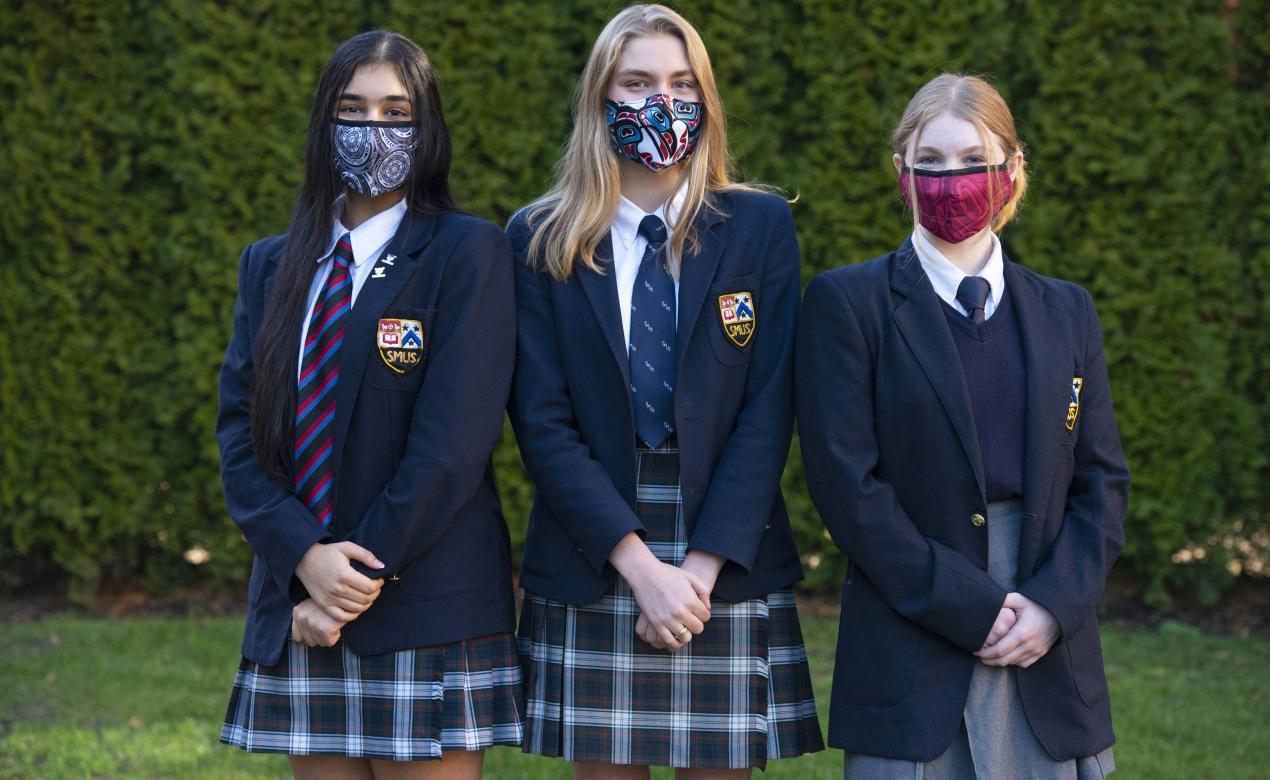
Be it resolved that a global pandemic cannot silence the voices of our passionate debaters and public speakers!
Hear ye! Hear ye! Floreat, our 2020-2030 strategic plan, calls for SMUS students to debate contrasting views with respect. SMUS joined the Debate and Speech Association of BC (DSABC) in 2020 and we have a new debate club! Meeting on Thursday afternoons, club members engage each other in some friendly verbal sparring on impromptu debate topics – no homework! Some topics are serious (Should all drugs be legalized?) and some are lighter (Should we really be reading Harry Potter?) The club welcomes all new members – no experience necessary. Students can bring their ideas for new debate topics, try on the “robe,” and give the gavel a smash. Members build leadership skills, too, by chairing debates. It’s great fun and wonderful training for life after SMUS.
There are also opportunities for students to take their skills to competitions, all of which are being held online this year. Club members have already taken part in a virtual national debate, and we are gearing up for regional competitions.
Competing on the Global Stage
SMUS is a proud member of the International Independent School’s Public Speaking Competition (IISPSC), a public speaking and debate league. SMUS will host the competition in the fall of 2023, drawing talented debate students from all over the world!
Each fall, students vie for one of three coveted spots on a team representing SMUS at this exciting international competition. This year’s representatives were Grade 11 student Meheq Bawa and Grade 12 students Federica di Frassineto and Sienna Pike. Normally held on the campus of a member school, it went virtual this year, a new and interesting forum.
Here’s some of what our three students had to say during their public speaking events.
In the following extract, Meheq warns her audience of the dangers the Internet poses to individual privacy:
"Imagine that over time your behaviour, the decisions you make, and your very identity are being experimented on and programmed by an algorithm. This might not seem like a serious issue because you trust your government. You LIKE Mr. Trudeau. But now, imagine that your country has a different kind of leader – a person like Hitler or Mussolini, in control of that very algorithm without you even noticing."
Federica spoke about the social consequences of a legal verdict of “non-insane automatism,” highlighting the case of Kenneth Parks. While sleepwalking, Parks killed his mother-in-law and seriously injured his father-in-law:
"It was murder, yes, but with no intent, since sleepwalkers are not conscious of their actions. This legal loophole leaves everyone unsatisfied including the victims, their families, friends, and even the murderer, because there is a feeling that justice has not been done. In fact, when Parks turned himself in on the morning in question, he said, 'I think I killed someone, and I feel terrible!'"
Federica proposed a solution rooted in restorative justice, an Indigenous approach to justice, where the perpetrator makes amends to surviving victims and their families.
Sienna delivered an after-dinner speech, a lighter but no less challenging event where speakers imagine they are addressing a gathering of like-minded people who have just finished dinner and are in the mood for a rousing speech. Past after-dinner speakers include a disgruntled elf complaining about Santa’s punitive working conditions, and a vampire musing on popular misconceptions about “vampire life.” In her hilarious speech, Sienna offered helpful tips to an audience of flight attendants on how to spin airline mistakes and cover up equipment flaws.
Meheq and Federica also teamed up in a cross-examination debate exploring whether COVID-19 has done more harm than good towards multilateralism. This style of debate includes courtroom-like sparring, where for three-minute sessions, one debater fires cross-examination style questions at another. It’s an exhilarating battle of the minds.
Gaining Skills That Better Our World
The free exchange of ideas is a cornerstone of democracy. SMUS students are eager to engage with other youth on topics that matter to them. They bring a special blend of enthusiasm and camaraderie to weekly Debate Club meetings. In our world today, media, technology, and current events drive individuals and groups towards polarized extremes. And yet, trending in the other direction, employers and institutions increasingly recognize the need for training in respectful disagreement and dispute resolution. Our club offers students a forum to air ideas and opinions in a formal and respectful manner. Those who can listen to understand, speak with conviction, and disagree with respect will make this world a better place.
If you are interested in learning more about debate and public speaking, the IISPSC website offers information on the competition and its events – how-to's, plus advice for how to proceed. Speech and Debate Canada, a new not-for-profit, also has helpful information on debate and public speaking in Canada. SDC offers courses and training, and is now hosting virtual debates. If you’d like to learn more about debating in BC, check out the DSABC website.
Students who are interested in getting involved in the SMUS Debate Club are encouraged to contact club heads Torr Large and Sebi Singh.


